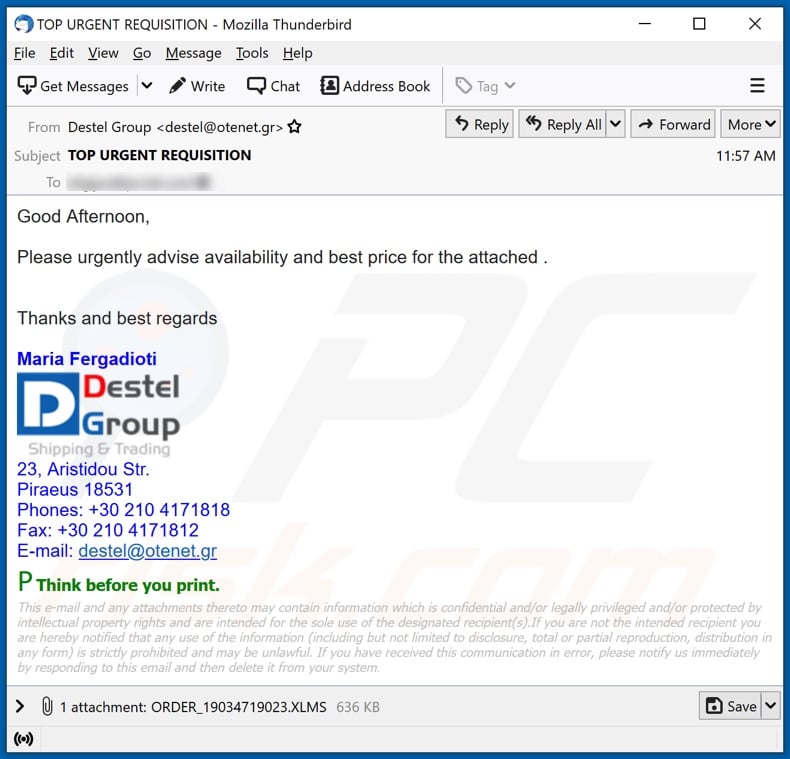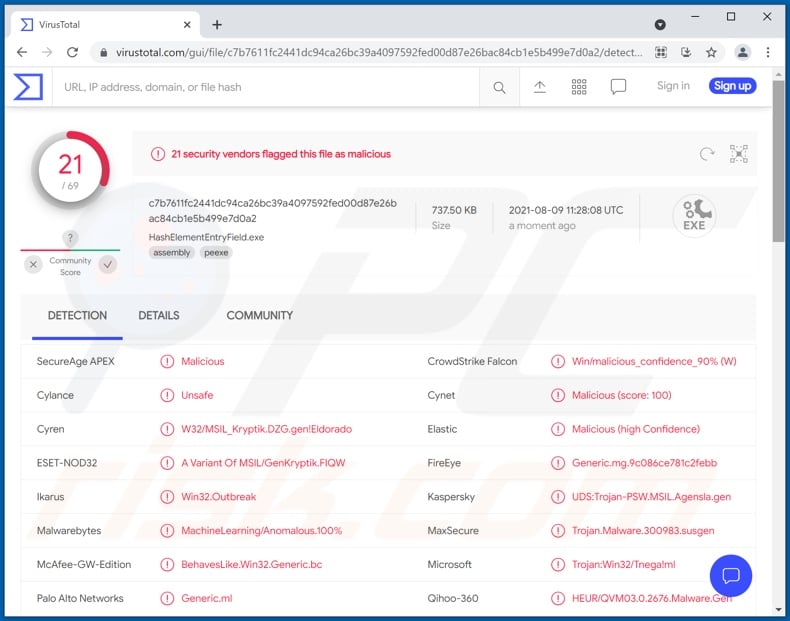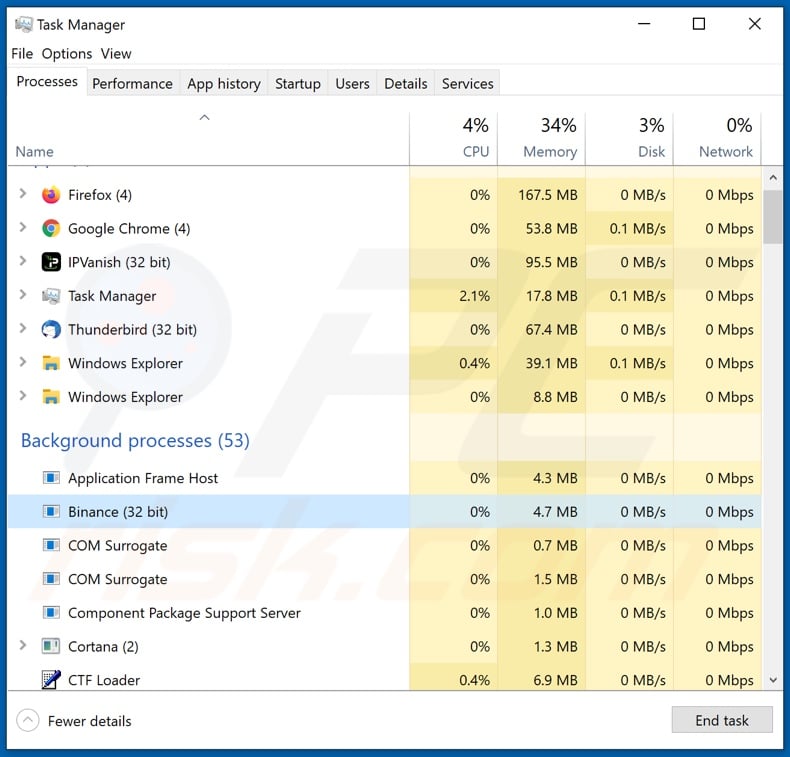Avoid infecting your device with malware via fake "Destel Group" email
Phishing/ScamAlso Known As: Destel Group spam
Get free scan and check if your device is infected.
Remove it nowTo use full-featured product, you have to purchase a license for Combo Cleaner. Seven days free trial available. Combo Cleaner is owned and operated by RCS LT, the parent company of PCRisk.com.
What is "Destel Group email virus"?
"Destel Group email virus" refers to a malware-spreading spam campaign. This term defines a mass-scale operation during which thousands of deceptive letters are sent. The scam emails distributed through this campaign are disguised as mail from Destel Group - a legitimate international trading and shipping company.
The aim of the fake letters is to infect recipients' devices with the Agent Tesla RAT (Remote Access Trojan). Malware within this classification operates by enabling remote access and control over infected machines, and this applies to Agent Tesla.

"Destel Group" fake email in detail
The "Destel Group" scam emails (subject/title "TOP URGENT REQUISITION"; may vary) request recipients to advise on, presumably, a product's availability and best price. It must be emphasized that these letters are fake, and all of the information provided by them - is false. Once the file attached to the emails is opened - Agent Tesla RAT's infection process (i.e., download/installation) is initiated.
Agent Tesla malware functionalities
As mentioned in the introduction, the Agent Tesla malicious program is designed to allow remote access and control over compromised devices. The main purpose of this remote access trojan is data theft. It has keylogging abilities, i.e., the trojan can record keystrokes.
Furthermore, it can extract information (primarily various account log-in credentials) from browsers, download managers, messengers, as well as email, VPN (Virtual Private Network), and FTP (File Transfer Protocol) clients. Another feature of this malware is taking screenshots.
Aside from extracting data, Agent Tesla can control the device by disabling Windows User Account Controls, Control Panel, and Folder Options; preventing users from opening Windows Task Manager, Command Prompt (cmd.exe), msconfig.exe, restoring Windows, and accessing the System Registry, etc.
To summarize, by trusting the "Destel Group" scam letters, users can experience system infections, severe privacy issues, financial losses, and even identity theft. If it is suspected or known that Agent Tesla RAT (or other malware) has already infected the device - an anti-virus must be used to remove it immediately.
| Name | Destel Group spam |
| Threat Type | Trojan, password-stealing virus, banking malware, spyware. |
| Hoax | Scam emails request recipients to advise on availability and pricing. |
| Disguise | Emails are disguised as letters from Destel Group. |
| Attachment(s) | ORDER_19034719023.XLMS (filename may vary) |
| Detection Names | Cyren (W32/MSIL_Kryptik.DZG.gen!Eldorado), ESET-NOD32 (A Variant Of MSIL/GenKryptik.FIQW), Kaspersky (UDS:Trojan-PSW.MSIL.Agensla.gen), Malwarebytes (MachineLearning/Anomalous.100%), Microsoft (Trojan:Win32/Sabsik.TE.B!ml), Full List Of Detections (VirusTotal) |
| Symptoms | Trojans are designed to stealthily infiltrate the victim's computer and remain silent, and thus no particular symptoms are clearly visible on an infected machine. |
| Payload | Agent Tesla |
| Rogue Process Name | Binance (not to be confused with the legitimate crypto exchange company; this name is an intentional disguise) |
| Distribution methods | Infected email attachments, malicious online advertisements, social engineering, software 'cracks'. |
| Damage | Stolen passwords and banking information, identity theft, the victim's computer added to a botnet. |
| Malware Removal (Windows) |
To eliminate possible malware infections, scan your computer with legitimate antivirus software. Our security researchers recommend using Combo Cleaner. Download Combo CleanerTo use full-featured product, you have to purchase a license for Combo Cleaner. 7 days free trial available. Combo Cleaner is owned and operated by RCS LT, the parent company of PCRisk.com. |
Spam campaigns in general
"Assurance Certificates", "LINPRA Email Virus", "Order Loading Information", "Coronavirus Track And Trace Result", and "Care Logistics Email Virus" are some examples of malware-proliferating spam campaigns. Spam mail is typically disguised as "official", "urgent", "important", and similar.
However, deceptive emails are not used exclusively to distribute malware; they are also employed to facilitate phishing and other scams. Due to the relative prevalence of spam letters, it is highly recommended to exercise caution with incoming emails and messages.
How did "Destel Group email virus" infect my computer?
Systems are infected via malicious files distributed via spam campaigns. The emails can have virulent files attached to them and/or contain download links of such content. Infectious files can be in various formats, e.g., Microsoft Office and PDF documents, archives (ZIP, RAR, etc.), executables (.exe, .run, etc.), JavaScript, and so forth.
When the files are opened - the infection process is triggered. For example, Microsoft Office documents cause infections by executing malicious macro commands. This process starts the moment a document is opened in Microsoft Office versions released prior to 2010. Newer versions have "Protected View" mode that prevents automatic execution of macros. Instead, users can manually enable macro commands (i.e., editing/content).
How to avoid installation of malware?
To avoid infecting the system via spam mail, it is expressly advised against opening suspicious and irrelevant emails - especially any attachments or links found in them. It is recommended to use Microsoft Office versions released after 2010.
Malware is also proliferated through dubious download channels (e.g., unofficial and freeware websites, Peer-to-Peer sharing networks, etc.), illegal activation tools ("cracks"), and fake updates. Therefore, it is important to download only from official/verified sources and activate/update programs with functions provided by genuine developers.
It is paramount to have a dependable anti-virus installed and kept updated. This software has to be used to run regular system scans and to remove threats. If you've already opened "Destel Group email virus" attachment, we recommend running a scan with Combo Cleaner Antivirus for Windows to automatically eliminate infiltrated malware.
Text presented in the "Destel Group" email letter:
Subject: TOP URGENT REQUISITION
Good Afternoon,
Please urgently advise availability and best price for the attached .
Thanks and best regards
Maria Fergadioti
Destel Group
Shipping & Trading
23, Aristidou Str.
Piraeus 18531
Phones: +30 210 4171818
Fax: +30 210 4171812
E-mail: destel@otenet.gr
P Think before you print.
Screenshot of VirusTotal detections of the malicious attachment distributed via "Destel Group" spam campaign ("ORDER_19034719023.XLMS"):

Screenshot of the malicious executable's process on Windows Task Manager (process name disguised as "Binance"):

Instant automatic malware removal:
Manual threat removal might be a lengthy and complicated process that requires advanced IT skills. Combo Cleaner is a professional automatic malware removal tool that is recommended to get rid of malware. Download it by clicking the button below:
DOWNLOAD Combo CleanerBy downloading any software listed on this website you agree to our Privacy Policy and Terms of Use. To use full-featured product, you have to purchase a license for Combo Cleaner. 7 days free trial available. Combo Cleaner is owned and operated by RCS LT, the parent company of PCRisk.com.
Quick menu:
- What is Destel Group spam?
- Types of malicious emails.
- How to spot a malicious email?
- What to do if you fell for an email scam?
Types of malicious emails:
![]() Phishing Emails
Phishing Emails
Most commonly, cybercriminals use deceptive emails to trick Internet users into giving away their sensitive private information, for example, login information for various online services, email accounts, or online banking information.
Such attacks are called phishing. In a phishing attack, cybercriminals usually send an email message with some popular service logo (for example, Microsoft, DHL, Amazon, Netflix), create urgency (wrong shipping address, expired password, etc.), and place a link which they hope their potential victims will click on.
After clicking the link presented in such email message, victims are redirected to a fake website that looks identical or extremely similar to the original one. Victims are then asked to enter their password, credit card details, or some other information that gets stolen by cybercriminals.
![]() Emails with Malicious Attachments
Emails with Malicious Attachments
Another popular attack vector is email spam with malicious attachments that infect users' computers with malware. Malicious attachments usually carry trojans that are capable of stealing passwords, banking information, and other sensitive information.
In such attacks, cybercriminals' main goal is to trick their potential victims into opening an infected email attachment. To achieve this goal, email messages usually talk about recently received invoices, faxes, or voice messages.
If a potential victim falls for the lure and opens the attachment, their computers get infected, and cybercriminals can collect a lot of sensitive information.
While it's a more complicated method to steal personal information (spam filters and antivirus programs usually detect such attempts), if successful, cybercriminals can get a much wider array of data and can collect information for a long period of time.
![]() Sextortion Emails
Sextortion Emails
This is a type of phishing. In this case, users receive an email claiming that a cybercriminal could access the webcam of the potential victim and has a video recording of one's masturbation.
To get rid of the video, victims are asked to pay a ransom (usually using Bitcoin or another cryptocurrency). Nevertheless, all of these claims are false - users who receive such emails should ignore and delete them.
How to spot a malicious email?
While cyber criminals try to make their lure emails look trustworthy, here are some things that you should look for when trying to spot a phishing email:
- Check the sender's ("from") email address: Hover your mouse over the "from" address and check if it's legitimate. For example, if you received an email from Microsoft, be sure to check if the email address is @microsoft.com and not something suspicious like @m1crosoft.com, @microsfot.com, @account-security-noreply.com, etc.
- Check for generic greetings: If the greeting in the email is "Dear user", "Dear @youremail.com", "Dear valued customer", this should raise suspiciousness. Most commonly, companies call you by your name. Lack of this information could signal a phishing attempt.
- Check the links in the email: Hover your mouse over the link presented in the email, if the link that appears seems suspicious, don't click it. For example, if you received an email from Microsoft and the link in the email shows that it will go to firebasestorage.googleapis.com/v0... you shouldn't trust it. It's best not to click any links in the emails but to visit the company website that sent you the email in the first place.
- Don't blindly trust email attachments: Most commonly, legitimate companies will ask you to log in to their website and to view any documents there; if you received an email with an attachment, it's a good idea to scan it with an antivirus application. Infected email attachments are a common attack vector used by cybercriminals.
To minimise the risk of opening phishing and malicious emails we recommend using Combo Cleaner Antivirus for Windows.
Example of a spam email:

What to do if you fell for an email scam?
- If you clicked on a link in a phishing email and entered your password - be sure to change your password as soon as possible. Usually, cybercriminals collect stolen credentials and then sell them to other groups that use them for malicious purposes. If you change your password in a timely manner, there's a chance that criminals won't have enough time to do any damage.
- If you entered your credit card information - contact your bank as soon as possible and explain the situation. There's a good chance that you will need to cancel your compromised credit card and get a new one.
- If you see any signs of identity theft - you should immediately contact the Federal Trade Commission. This institution will collect information about your situation and create a personal recovery plan.
- If you opened a malicious attachment - your computer is probably infected, you should scan it with a reputable antivirus application. For this purpose, we recommend using Combo Cleaner Antivirus for Windows.
- Help other Internet users - report phishing emails to Anti-Phishing Working Group, FBI’s Internet Crime Complaint Center, National Fraud Information Center and U.S. Department of Justice.
Share:

Tomas Meskauskas
Expert security researcher, professional malware analyst
I am passionate about computer security and technology. I have an experience of over 10 years working in various companies related to computer technical issue solving and Internet security. I have been working as an author and editor for pcrisk.com since 2010. Follow me on Twitter and LinkedIn to stay informed about the latest online security threats.
PCrisk security portal is brought by a company RCS LT.
Joined forces of security researchers help educate computer users about the latest online security threats. More information about the company RCS LT.
Our malware removal guides are free. However, if you want to support us you can send us a donation.
DonatePCrisk security portal is brought by a company RCS LT.
Joined forces of security researchers help educate computer users about the latest online security threats. More information about the company RCS LT.
Our malware removal guides are free. However, if you want to support us you can send us a donation.
Donate
▼ Show Discussion